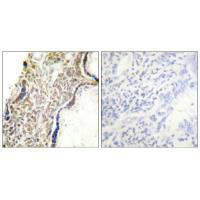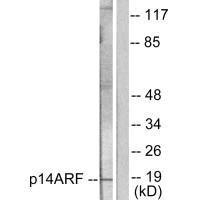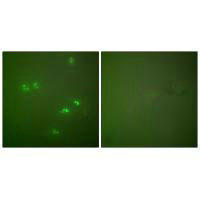| UniProt Protein Function: | p16-INK4A iso4: a cell-cycle regulatory protein that interacts with CDK4 and CDK6, inhibiting their ability to interact with cyclins D. Inhibits the phosphorylation of the retinoblastoma protein by CDK4 or CDK6, and entry into the S phase of the cell cycle. The p16INK4A and p14ARF proteins are encoded by CDKN2A, a known tumour suppressor gene in multiple cancers. CDKN2A is inactivated in 72% of cases of lung squamous cell carcinoma: 21% by epigenetic silencing by methylation, 18% inactivating mutation, 4% by exon 1b skipping, and 29% by homozygous deletion. Defects in CDKN2A are the cause of familial atypical multiple mole melanoma-pancreatic carcinoma syndrome, Li-Fraumeni syndrome, and the melanoma-astrocytoma syndrome. The melanoma-astrocytoma syndrome is characterized by a dual predisposition to melanoma and neural system tumors, commonly astrocytoma. Four alternatively spliced p16 isoforms have been reported. Two alternatively spliced isoforms of ARF have been reported. |
| UniProt Protein Details: | Protein type:Tumor suppressor; Cell cycle regulation; Nucleolus Chromosomal Location of Human Ortholog: 9p21 Cellular Component: cytoplasm; cytosol; nucleus Molecular Function:cyclin-dependent protein kinase inhibitor activity; NF-kappaB binding; protein binding; protein kinase binding Biological Process: cell cycle arrest; G1/S transition of mitotic cell cycle; inhibition of NF-kappaB transcription factor; negative regulation of cell growth; negative regulation of cell proliferation; negative regulation of cell-matrix adhesion; negative regulation of cyclin-dependent protein kinase activity; negative regulation of phosphorylation; negative regulation of transcription, DNA-dependent; Ras protein signal transduction Disease: Li-fraumeni Syndrome 1; Melanoma, Cutaneous Malignant, Susceptibility To, 2; Melanoma-astrocytoma Syndrome; Melanoma-pancreatic Cancer Syndrome |
| NCBI Summary: | This gene generates several transcript variants which differ in their first exons. At least three alternatively spliced variants encoding distinct proteins have been reported, two of which encode structurally related isoforms known to function as inhibitors of CDK4 kinase. The remaining transcript includes an alternate first exon located 20 Kb upstream of the remainder of the gene; this transcript contains an alternate open reading frame (ARF) that specifies a protein which is structurally unrelated to the products of the other variants. This ARF product functions as a stabilizer of the tumor suppressor protein p53 as it can interact with, and sequester, the E3 ubiquitin-protein ligase MDM2, a protein responsible for the degradation of p53. In spite of the structural and functional differences, the CDK inhibitor isoforms and the ARF product encoded by this gene, through the regulatory roles of CDK4 and p53 in cell cycle G1 progression, share a common functionality in cell cycle G1 control. This gene is frequently mutated or deleted in a wide variety of tumors, and is known to be an important tumor suppressor gene. [provided by RefSeq, Sep 2012] |
| UniProt Code: | Q8N726 |
| NCBI GenInfo Identifier: | 384872321 |
| NCBI Gene ID: | 1029 |
| NCBI Accession: | Q8N726.2 |
| UniProt Secondary Accession: | Q8N726,Q13195, Q13399, Q16360, Q7KZR9, D3DRK2, |
| UniProt Related Accession: | P42771,Q8N726 |
| Molecular Weight: | 16,533 Da |
| NCBI Full Name: | Tumor suppressor ARF |
| NCBI Synonym Full Names: | cyclin dependent kinase inhibitor 2A |
| NCBI Official Symbol: | CDKN2A |
| NCBI Official Synonym Symbols: | ARF; MLM; P14; P16; P19; CMM2; INK4; MTS1; TP16; CDK4I; CDKN2; INK4A; MTS-1; P14ARF; P19ARF; P16INK4; P16INK4A; P16-INK4A |
| NCBI Protein Information: | cyclin-dependent kinase inhibitor 2A |
| UniProt Protein Name: | Tumor suppressor ARF |
| UniProt Synonym Protein Names: | Alternative reading frame |
| Protein Family: | Tumor suppressor |
| UniProt Gene Name: | CDKN2A |
| UniProt Entry Name: | ARF_HUMAN |






